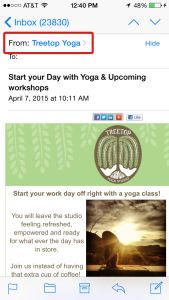
I spend more time in my kitchen than I do in any other room in my apartment. I’m a baker by training, but I love cooking just as much. For me, preparing food isn’t just about enjoying a delicious meal (although that’s admittedly part of it). I enjoy the science that goes into taking a bunch of ingredients, mixing them in the right proportions, cooking them just the right way, and ending up with a final result that’s alchemically more than the sum of its parts.
There’s one big difference when it comes to baking and cooking, and that’s how you approach recipes. An experienced home cook will use a recipe as more of a guideline than an exact rule book. If you know basic techniques, you can fiddle around with seasonings, omit ingredients, and make substitutions while still ending up with a tasty dish. A home baker, however, knows that messing around with a recipe will likely end in disaster.
I think of social media marketing as being pretty similar to baking. It takes a little bit of science and a little bit of art to make something truly amazing. Sure, every program has a different set of considerations depending on your business’s industry, location, and target audience. But in general, your success depends on finding the right “recipe” for your content, cadence, and interactions with followers and influencers.
Today, many social media managers are developing recipes for their programs that are pretty good—but even so, something seems to be missing. And this missing ingredient could be the difference between scoring a decent review in a local paper and receiving a Michelin Star.
What is this missing social media marketing ingredient? Interactive content. In this article, we’ll explore 3 main reasons that interactive content and social marketing pair so nicely together.
Visual Content Outperforms Text Content on Social

Source: WTTW
Unless you’ve been hiding under a rock for the past 5 years, you’ve probably noticed that visual content is on the rise. Users are more engaged with visual content on social networks, and they’re more likely to share visual content with other people on social as well. A few stats to help reinforce this argument (in case you don’t believe me):
- Tweets with images receive 18% more clicks, 89% more favorites, and 150% more retweets than text-only posts.
- Facebook posts with photos see the most engagement, accounting for a whopping 87% of total interactions.
- Over 50% of 25-54 year olds share videos online.
- Visual content (images, videos, and GIFs) makes up 58% of all content shared online.
- B2B and B2C marketers named video as one of the three most effective social media marketing tactics in 2014.
Following this chain of logic, interactive content is a slam dunk when it comes to social media marketing. It’s super visual—most pieces usually incorporate static images and GIFs or videos. It’s also highly engaging due to its novelty. After all, people see autoplay videos about 30 times a day—but do they see super awesome interactive eBooks or infographics that often? Nope.
Followers Prefer Bite-Sized Content

Source: Chicago Parent
There’s a reason the whole “Ain’t nobody got time for that!” meme has become part of our modern lexicon. We all have a lot to do (or if we don’t, we like to pretend we do). In the modern economy, time is one of our most precious resources, and we’re reluctant to spend too much of it in any one place.
We’ve seen the truth of this reality play out in our own lives, and survey data backs up this anecdotal sentiment. For example, studies have shown that:
- The average attention span of a consumer online is 8 seconds, dropping 4 seconds since 2000.
- 55% of visitors spend less than 15 seconds on an article from a digital publisher.
- 95% of B2B buyers agree that they prefer shorter content formats.
What does this mean for marketers? It means that our audience is distracted and increasingly reluctant to give us their full attention. It doesn’t mean that viewers will never deeply engage with our content—but it does mean that we have to work harder to earn their engagement than we’ve ever had to work before.
There are two primary ways to attack this internet ADD problem:
- Take the BuzzFeed approach, appeasing the desire for surface-level content that’s amusing and low-commitment.
- Find a better way to deliver rich, meaningful content in bite-sized packages.
As a storyteller who cares about communicating things that matter, I’m a passionate advocate for the second solution. I recognize that shoving a 5000-word article in front of the average web surfer is probably not going to go over well. But I also refuse to believe that the speed-dating approach to content is the only viable option left to content marketers. People still care about stories—we’re hard-wired to need them and respond to them. We just need to share them in an evolved way that reflects how our prospects and customers behave.
Interactive content is the next evolution of digital storytelling. Using the power of interactions, animations, and navigation, you can provide a much more flexible experience for your viewers. Those who are pressed for time can jump straight to the parts they care about and consume just the first “bite” of content. Those with more time can delve deeply into each topic at whatever pace and in whatever order they prefer.
Instead of forcing readers to choose a drive-thru meal or a full-on tasting menu, interactive content provides a full-service restaurant where they can get a quick appetizer or stay for a multi-course meal.
Interactive Content Cuts Through the Digital Noise

Source: PaxArcana
I stumbled across this stat last week that totally blew my mind:
The average social media user encounters 285 pieces of content per day, totaling an average of 54,000 words and 443 minutes of video.
For serious?! This is a crazy amount of content. It’s impossible for anyone to keep up, even people who consume content 24/7.
On social media, the burden falls to your community manager to choose compelling copy and images that will appeal to your followers and stand out in the deafening cacophony of voices shouting for attention. But the key to retaining your audience’s attentions is by providing unique, compelling, useful content that makes a great impression. Once you’ve delivered a great experience, viewers will start to seek out your content actively rather than passively letting it flow by in their newsfeed.
Interactive content is hands down the most exciting, original format available to marketers and consumers today. Paired with great stories and beautiful graphics, interactivity can help brands and businesses cut through all the digital noise and make their messages heard.
The Bottom Line
The key ingredient in any social media marketing program is great content. The new secret sauce on the market that can take your program to the next level is interactive content. This one addition can transform your entire marketing recipe, equipping you to create content your followers will come back to enjoy again and again.
This post originally appeared on the Ceros Blog.
(190)
Report Post









